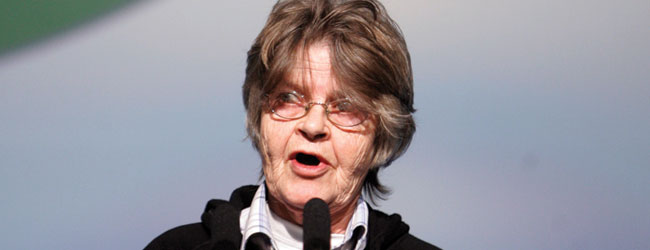9 September 2011
DUBLIN VOLUNTEERS DINNER DANCE 2011 HONOUREE | ROSE DUGDALE
From Chelsea debutante to the IRA
 ROSE DUGDALE came from a wealthy English background and her journey into the Irish republican struggle stems from her inherent interest in the world around her. From her idyllic childhood on a farm in Devon, to her nine-year prison sentence and finally her progression into Sinn Féin, Rose’s contribution to republicanism is being honoured at this year’s annual Dublin Volunteers Dinner Dance in November.
ROSE DUGDALE came from a wealthy English background and her journey into the Irish republican struggle stems from her inherent interest in the world around her. From her idyllic childhood on a farm in Devon, to her nine-year prison sentence and finally her progression into Sinn Féin, Rose’s contribution to republicanism is being honoured at this year’s annual Dublin Volunteers Dinner Dance in November.
» BY SORCHA BERRY
BORN into a wealthy family in Devon, in the south-west of England, Rose Dugdale’s childhood was idyllic and she spent her early years surrounded by wildlife. She was a keen hunter and was a self-proclaimed ‘Tom Boy’. She spent some holidays in Scotland where she went stalking, shooting grouse and salmon fishing. Rose talks fondly of her upbringing:
“I had a marvellous life. It’s certainly safe to say that money was never a great shortage.”
She went to the magnificently-named Miss Ironside’s School for Girls in Kensington and her family home was in Chelsea.
In 1959, she studied at St Anne’s College, University of Oxford, where she says she was surrounded by “brilliant” tutors.
“University was a time to relax, learn, think and talk with people. My tutors were wonderful but they didn’t politicise me; I was just always very enthusiastic to learn something about the world.”
After studying in America for a Master’s Degree, Rose returned to England where she taught economics and obtained a doctorate in Philosophy.
She was heavily involved in the demonstrations against the Vietnam War and it was this that led her to visit Cuba for summer camps that were set up by Fidel Castro to attract Vietnam War activists.
“It was in Cuba that I saw the possibility of socialism in the making. Academic life was dominated by great new theorists such as Marx and Mao and it really felt possible to change the world.”
Rose became involved in working-class movements in Tottenham, north London, a community with high poverty rates and a huge Irish population. It was around this time (1972) that Bloody Sunday happened and that event had a profound effect on Rose and spurred her decision to join the republican armed struggle.
“There was a struggle going on right on my doorstep in Ireland and there was never any doubt that I had to be involved. When I got off the boat in Belfast, I saw the British Army on the streets in their uniforms with their high-tech weapons. I saw British troops raid a set of flats and I found it horrifying. I became anxious to get involved in the armed struggle.”
In June 1974, Rose was sentenced to nine years in prison by a Dublin court for her role in IRA operations and months into her sentence in Limerick Prison she discovered she was pregnant.
“I wasn’t scared at all. Being pregnant felt nice. I was delighted.”
Her main concern in prison had to do with the ordinary prisoners.
“They lived in appalling circumstances and we could do very little to help them. The authorities treated them terribly and drove some to suicide. For them a prison sentence of a few months was horrible; as republican prisoners, we knew why we were there — we were prepared for it.”
Her time in prison shaped her participation in the movement upon her release.
“The fact that I was an ex-prisoner gave me a certain status within the Republican Movement. There had always been an attitude that I was from a strange background, from the monied classes. I was considered an oddball and a maverick. Some would have said that I belonged with the Stickies because I wasn’t the ‘typical’ republican.”
Soon after being released from prison, Rose joined Sinn Féin.
“My background had me believe that armed struggle was the only way forward but the revolutionary army that was the IRA had achieved its principal objective, which was to get your enemy to negotiate with you. They did that with amazing skill and ability and I can’t help but respect what was done in terms of the Good Friday Agreement.”
Coming from such a wealthy background, Rose has no regrets about her decision to leave everything behind her and take part in the Irish struggle.
“I did what I wanted to do. I am proud to have been part of the Republican Movement and I hope that I have played my very small part in the success of the armed struggle.”
Follow us on Facebook
An Phoblacht on Twitter
Uncomfortable Conversations

An initiative for dialogue
for reconciliation
— — — — — — —
Contributions from key figures in the churches, academia and wider civic society as well as senior republican figures




